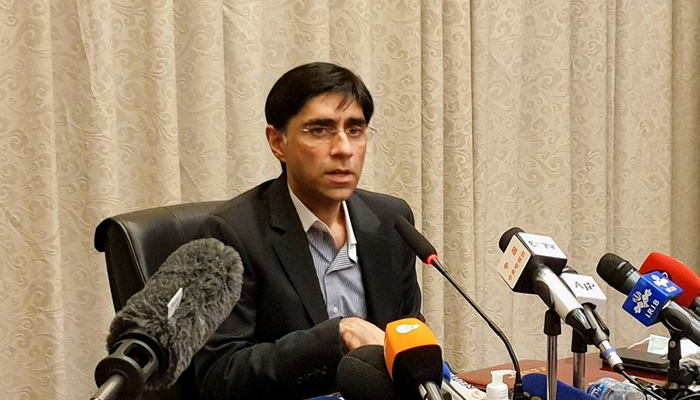NSA Yusuf calls for probing 'real circumstances' behind Indian missile incident
World must consider whether India can ensure safety of its nuclear, other high-end weapon systems, NSA says
March 11, 2022

- On March 9, a supersonic projectile from India landed in Pakistan.
- NSA Yusuf questions India's ability to handle sensitive technology.
- He says it was "highly irresponsible" of India to not inform immediately.
ISLAMABAD: National Security Adviser (NSA) Moeed Yusuf Friday called for an investigation into the real reasons behind the Indian missile's landing inside Pakistani territory as he termed New Delhi's clarification over the matter as suspicious.
On March 9, a supersonic projectile from India travelling at a high speed landed inside the Pakistani territory and fell near Mian Channu in Khanewal district.
In response, the Foreign Office said Friday morning Pakistan strongly condemned the unprovoked violation of its airspace by a "super-sonic flying object" of Indian origin.
After more than two days, India accepted that this was their missile launched "ostensibly" due to a technical malfunction during maintenance, the NSA said in a series of tweets.
In a statement Friday evening, the Indian government "deeply" regretted the incident and said it had taken "serious view and ordered a high-level Court of Enquiry".
Read more: Accidentally fired missile into Pakistan, says India
However, the NSA said the development raised serious questions about India’s ability to handle such sensitive technology as the missile travelled close to the path of international and domestic commercial airlines — threatening the safety of civilians.
Yusuf also said it was "highly irresponsible" of New Delhi's authorities not to have informed Pakistan immediately that an inadvertent launch of a cruise missile had taken place.
He carried on that in a nuclear environment, such callousness and ineptitude raised questions about the safety and security of Indian weapon systems.
"Already, there have been multiple incidents of uranium theft in India and its citizens have even been arrested while smuggling uranium in the recent past," the NSA said.
The security adviser said Pakistan has constantly called on the world community to look at India’s irresponsible behaviour that continues to pose a threat to regional stability.
However, Islamabad's calls have been ignored, he lamented.
The NSA said given this incident, and earlier ones, the world must consider whether India is able to ensure the safety and security of its nuclear and other high-end weapon systems.
"It is hard to believe anything this Indian government says. Therefore, the real circumstances surrounding this incident must also be investigated to ascertain if this was an inadvertent launch or something more intentional," he noted.
The world must remove its blinders about the Indian state’s behaviour within its country, its diplomatic direction, and its disregard for the need for peace and stability in its neighbourhood.
"The world must treat this incident with the urgency, sensitivity, and alarm it deserves," he added.
India's response to missile incident
India earlier today said it accidentally fired a missile into Pakistan because of a "technical malfunction" during routine maintenance.
"On 9 March 2022, in the course of a routine maintenance, a technical malfunction led to the accidental firing of a missile," the Indian government said in a statement.
"It is learnt that the missile landed in an area of Pakistan. While the incident is deeply regrettable, it is also a matter of relief that there has been no loss of life due to the accident."
“The Government of India has taken a serious view and ordered a high-level Court of Enquiry,” the statement added.
Indian projectile enters Pakistani airspace
In a Thursday press conference in Rawalpindi, Director-General of the Inter-Services Public Relations (ISPR) Maj Gen Babar Iftikhar revealed that an Indian projectile had entered the Pakistani airspace and fell near Mian Channu in Khanewal district, causing some damage to the surrounding areas.
The DG ISPR said: "At 6:43pm [on Wednesday], a high-speed flying object was picked up inside the Indian territory by the Air Defence Operation Centre of the Pakistan Airforce."
"From its initial course, the object suddenly manoeuvred towards the Pakistani territory and violated Pakistan's airspace [before] ultimately falling near Mian Channu at 6:50pm."
He said that when the projectile fell, it damaged some civilian property. "Thankfully, no loss or injury to human life was caused."
A Pakistan air force official said the object travelled at an altitude of 40,000 feet, at Mach 3, and flew 124 kilometres (77 miles) in Pakistani airspace before crashing.











